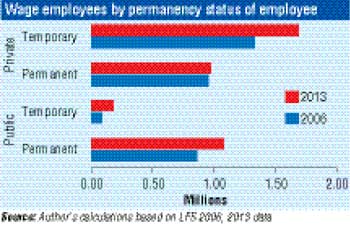Saturday Feb 21, 2026
Saturday Feb 21, 2026
Tuesday, 15 August 2017 00:00 - - {{hitsCtrl.values.hits}}
 By Priyanka Jayawardena
By Priyanka Jayawardena
More than half of Sri Lanka’s wage employees are engaged in non-standard forms of employment, as temporary/casual workers or workers without a permanent employer. These non-permanent workers are often subject to unstable employment, with insecure employer contracts, limited social security, low pay, and poor working conditions.
Given the uncertain nature of their employment, such workers also find it more difficult to plan their lives in the long-term. The need to promote more decent work in the country is therefore an important policy objective. This calls for exploring ways of transforming non-standard forms of employment to work of greater quality.
Defining non-standard employment
The following three types of employment are considered as non-standard forms of employment: (1) temporary employment; (2) casual employment; (3) employees who do not have permanent employer.
Key findings
More than half of the wage employees are temporary workers. As of 2013, out of the total wage employees of 4.7 million, 56% (2.6 million) were in non-standard forms of employment.
A total of 90% of temporary and casual workers are attached to the private sector. Further, the private sector has expanded for temporary and casual jobs in the recent past. During the 2006-2013 period, temporary and casual workers in the private sector have increased by over 350,000 while permanent employees attached to the private sector have increased only by 15,000 during the same period.
The majority of the temporary/casual workers are not benefitted under social security schemes. The EPF Act covers any employee irrespective of whether they are permanent, temporary, casual or shift workers. However, data reveals that out of the temporary workers, 86% are not covered by the pension scheme or the provident fund.
Most of the temporary employees are not given any written contract. Although it is an obligation to issue a letter of appointment to employees, around 83% of temporary and casual employees have not received a written contract. Absence of documentation to establish employee employer relationship may dilute the worker rights that are stipulated in labour legislation.
Huge, inexplicable wage differences exist between permanent and temporary workers. The difference in monthly wages between standard versus non-standard forms of employment were 89%, favouring standard employment. Of the wage differences, 43% were due to unexplained reasons, such as unequal treatment of non-standard workers and probationary nature of employment.
Manpower workers are treated differently to their permanent counterparts and lack access to social protection, receive low wages, etc. Workers who are not directly hired by the organization they work for, but are hired by third party agents or sub-contractors are referred to as manpower workers. Manpower workers are not given a contract letter either by the company they work for, or by the manpower agency. It is a precarious work arrangement, and raises serious concern, as it is often unclear who is responsible and accountable for the rights and benefits of these workers.
Study findings revealed that labour supply side issues such as less educated, unskilled workers and new labour market entrants were more likely to be engaged in non-standard forms of employment. These factors negatively affect employer's selection criteria for permanent job opportunities.
Policy recommendations
Both labour supply side issues as well as limited permanent job opportunities influence the higher incidence of non-standard employment in Sri Lanka. Study findings revealed that there are two main reasons for increasing trends of non-standard forms of employment in Sri Lanka.
 Data reveals that private sector has expanded more for temporary and casual jobs in the recent past which creates demand shortages for permanent job opportunities in the labour market. Also, labour supply side issues such as less educated, unskilled workers and new labour market entrants were more likely to be engaged in non-standard forms of employment. Therefore, measures need to be taken aiming at restricting the expansion of precarious work while protecting the worker rights of precarious workers; it is also necessary to give ways for more and better job creation while addressing the skill gap issues.
Data reveals that private sector has expanded more for temporary and casual jobs in the recent past which creates demand shortages for permanent job opportunities in the labour market. Also, labour supply side issues such as less educated, unskilled workers and new labour market entrants were more likely to be engaged in non-standard forms of employment. Therefore, measures need to be taken aiming at restricting the expansion of precarious work while protecting the worker rights of precarious workers; it is also necessary to give ways for more and better job creation while addressing the skill gap issues.
It is important to have regulatory mechanisms to protect the worker rights of non-standard forms of employment, including equality of employment conditions, social protection, etc. As a first step, issuance of letters of employment to all temporary, hired employees should be made compulsory for companies that use such hired labour. Once a contract is awarded, the tenderer is required to provide a list of employees delivering services, working hours, leave entitlement, etc. Also, it should be necessary to provide a pay slip with details of wages, social security, taxes, and allowances and deductions.
The use of temporary workers and agency workers must be limited to legitimate needs – for example, to meet the seasonal demand of businesses, to provide supplementary services such as security, and janitorial services. Through such measures, companies can be discouraged from increasing temporary or agency workers above a reasonable threshold.
There is also a critical need to regulate all manpower agencies. As a first step, all the manpower agencies should be registered under the Department of Labour. In addition, legitimate measures should be taken to ensure that workers in triangular relationships can participate in meaningful collective bargaining. Working with trade unions to promote the above-mentioned standards is recommended.
Addressing labour supply side issues: Findings of this study revealed that less educated people and new labour market entrants are more likely to be engaged in non-standard employment. This is mainly due to existing skill gaps of school leavers. Therefore, a proper training system should be initiated for students after sitting for O-Levels to address the skill gaps. Training programme should be more work-oriented technical training programmes in different fields – such as hotel, construction, textile and garment sectors.
Giving ways for more and better jobs: Increased legislation alone will not work as it will make it difficult to attract private investment. Therefore, multiple strategies are needed to combat the growth of non-standard forms of employment. Government could facilitate permanent employment in the private sector with introducing strategic protective measures to safeguard the rights and benefits of the workers, such as unemployment insurance, universal pension schemes, etc.
It is difficult to completely eliminate this type of labour as it has been integrated into the labour market. The final objective of all these efforts is to provide a safe and decent working environment for the future generation.
[Priyanka Jayawardena is a Research Economist at the Institute of Policy Studies of Sri Lanka (IPS). This article is based on an IPS Study on ‘Why People Choose to Participate in the Non-Standard Forms of Employment in Sri Lanka’.]